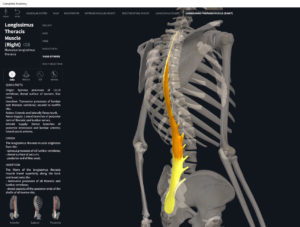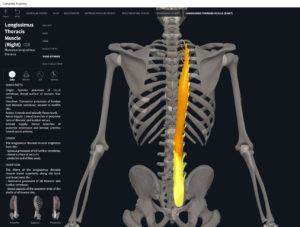Structure.
- Origin: transverse processes of L1-L5.
- Insertion: transverse process T1-T12; superior lumbar vertebrae ribs 9-10.
Function.
- Concentric action: spinal extension, rotation and lateral flexion.
- Eccentric action: spinal flexion, rotation, and lateral flexion.
- Isometric action: stabilization of the spine.
- Innervation: thoracic and lumbar spinal nerves.
- Arterial supply: dorsal branches of the posterior intercostal arteries.
Clinical Significance.
References
Biel, A. (2015). Trail guide to the body: A hands-on guide to locating muscles, bones and more.
Clark, M., Lucett, S., Sutton, B. G., & National Academy of Sports Medicine. (2014). NASM essentials of corrective exercise training. Burlington, MA: Jones & Bartlett Learning.
Jenkins, G., & Tortora, G. J. (2012). Anatomy and Physiology: From Science to Life, 3rd Edition International Stu. John Wiley & Sons.
Muscolino, J. E. (2017). The muscular system manual: The skeletal muscles of the human body.


